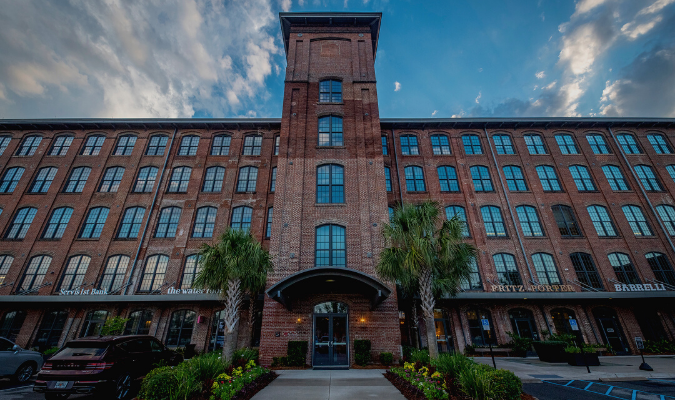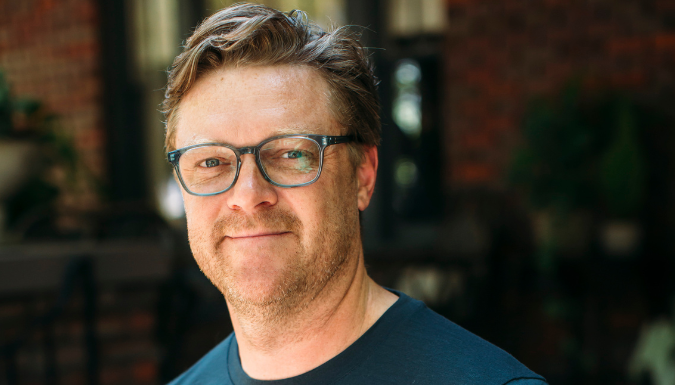Clemson Design Center in Charleston
The Clemson Design Center in Charleston (CDC.C) is home to a unique collection of design and preservation programs. The CDC.C is located in the Cigar Factory on East Bay Street. The former cigar and textile manufacturing plant, built in 1881, is on the National Register of Historic Places. The Clemson Design Center includes studio space, classrooms, seminar rooms, laboratories, a library, multipurpose space, shop spaces, faculty and staff offices.

Programs and Information
-
Clemson Architecture Center in Charleston
The Clemson Architecture Center in Charleston (CAC.C) is a community service-oriented program structured to bridge academia and practice by teaching in a hybrid environment.
The CAC.C provides a unique urban educational experience for Clemson Richard A. McMahan School of Architecture students. The CAC.C is dedicated to bridging academia and practice by teaching in a hybrid environment - a cross between academic and professional modes of work - with a faculty comprised of practicing architects. Students are offered opportunities for internships (professional experience, academic credit, AXP credit, tuition offsets and compensation) with local architects, landscape architects, urban designers, planning agencies, constructors and nonprofits.
Studios are structured in two tracks, Community Build and Studio U. The former is a design-build studio, and the latter is a building/community/urban architecture studio. Both service-learning studios engage directly with community, governmental and private clients that require students to manage practical expectations, issues and demands of a professional practice while gaining significant design experience. Committed to service-learning, students work on community-based issues and projects and are encouraged to work collaboratively. Over 1,000 students have engaged in community-based education in Charleston since 1988.
Students are encouraged to live on the Charleston peninsula to allow them to experience the richness of Charleston's urban life, historic architectural fabric and one of the great "foodie" cities in America.
CAC.C Courses:
- Studio U or Community Build (6 credits)
- Architecture Seminar* Building Technology (3 credits)
- Architectural History Of Place*_History/Theory (3 credits)
- Graduate Theory III (3 credits) – Spring only, required for grads
- Introduction To Craft (3 credits) – Required for A+CB in fall
- Field Studies (3 credits) – required for LARC
- Mentorship / Internship (3 credits) – Required both semesters for IPAL
- Community 1:1 (3 credits) – Spring only, required for grads in A+CB program
Students are Required 12 credits minimum of CAC.C courses
*Required for ARCH undergrads (either semester)
-
Master of Science in Historic Preservation
The Clemson University Historic Preservation programs equip students with the knowledge and technical expertise essential for careers in the conservation and management of historic buildings, sites, objects and landscapes. Utilizing Charleston and the Lowcountry as its principle laboratory, the HP programs emphasizes community engagement, interdisciplinary collaboration and research that contributes new knowledge to the development of sustainable preservation strategies, placing students at the intersection of materials science and architectural forensics.
Learn more about the Master of Science in Historic Preservation
-
Integrated Path to Architectural Licensure
The Integrated Path to Architectural Licensure (IPAL) provides an opportunity to fulfill the requirements for architectural licensure while completing the architectural degree. The Clemson University Richard A. McMahan School of Architecture has been selected by NCARB as one of the accredited programs to participate in this initiative and has developed a rigorous curriculum track that integrates the academic components of architectural study with the internship and examination components requisite to architecture licensure. For a typical student starting in the undergraduate program at Clemson, this plan of study requires one additional year, working in an office, to complete the degree and program. For students starting in the graduate program there are a few options depending on the amount of AXP earned prior to starting school. Please see this outline for further details. (provide link to the document Bryan put together)
-
Architecture + communityBUILD
For decades, Clemson Architecture students have been involved in various community-oriented design-build and service-learning projects. Through community engagement and appropriate design solutions, Architecture + communityBUILD (A+cB) students learn how architecture can be a catalyst for positive change.
This program is designed for M.Arch students who wish to further their understanding and application of a community centric architecture + process, design + building at full scale, sustainable programming + entrepreneurship, and post project documentation + sustained community impact. True to the University’s mission, the program embodies the spirit of service-learning and student engagement while celebrating family and community living, sustainable environments, leadership and entrepreneurism and general education.
The A+cB program involves required architectural design studios and required courses that address specific projects and research questions associated with community design, sustainable practices, and full-scale design and building. The certificate requires 18 credit hours of design studios and courses at the Clemson Architecture Center in Charleston (CACC) that can be used to partially fulfill the requirements for the M.Arch degree. The earned certificate will be acknowledged on the recipient's academic transcript.
Admission to the Architecture + communityBUILD certificate program will be granted through a competitive application process based on portfolio, GPA, and personal interview. Admission will also require application to and acceptance of placement for off-campus study in Charleston in semesters 4 and 5 (Spring and Fall).
The courses required to fulfill certificate requirements are the following:
SEMESTER 4 (SPRING) in CHARLESTON:
- ARCH 8520 / A+cB Studio (6 credits)
- ARCH 8320 Community 1:1 (3 credits)
SEMESTER 5 (FALL) in CHARLESTON:
- ARCH 8570 / A+cB Studio(6 credits)
- ARCH 6770 Introduction to Craft (ITC) (3 credits)
Note that these courses will be open to those not enrolled in the certificate program, although space may be limited.
Follow along with the design and build process and see past projects on the Architecture + community Build Blog.
Want to see where all Architecture + community Build projects are located and learn more about each project? Visit the A+cB story map.
-
Housing
Students are encouraged to live on the peninsula, within walking or biking distance of the CDC.C, so that they can experience the city and its architecture to its fullest. Students can utilize the Off Campus Housing resources here, https://www.clemsonoffcampus.com/ or other apartment websites. Finding housing in Charleston requires planning to negotiate your Clemson apartment lease with the timing of your housing in Charleston. If placed in Charleston more resources will be provided to aid your preparation for studying at the CAC.C.
-
Contact
Bradford Watson
Director of the Clemson Architecture Center in Charleston
Director, Resilient Urban Design
Interim Director, Historic Preservation
Email: bawatso@clemson.eduDavid Pastre
Director of the Clemson Design Center in Charleston
Email: pastre@clemson.eduMimi Rose
Administrative Coordinator
Email: miriamr@clemson.eduCarla Clark
Student Services Program Coordinator
Email: carla7@clemson.eduAddress
701 East Bay St., Suite 202
Charleston SC, 29403
Phone: 843-723-1747
CAC.C Linktree
MSHP Linktree
Master of Science in Historic Preservation
Integrated Path to Architectural Licensure
Virtual Tour
Contact
David Pastre
Director, Clemson Design Center in Charleston
Phone: 843.723.1747 Email: pastre@clemson.edu


